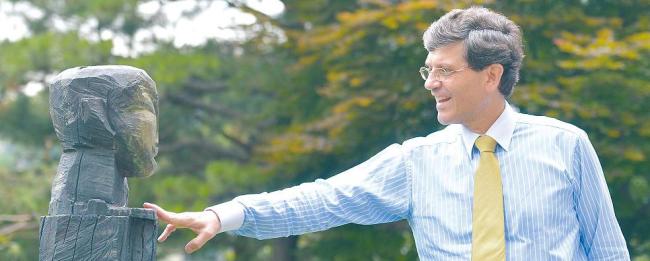Ambassadors do not have a lot of personal time, so making an effort to experience and travel around their appointed country is not easy for most. But soon-to-depart German Ambassador Hans-Ulrich Seidt has not only made the time ― he is one of the most traveled ambassadors of the diplomatic corps after three years here.
Seidt’s efforts to familiarize himself with the country started even before he was appointed as the ambassador.
“Before our appointment as ambassador we decided that we should go to a place outside of Seoul,” said Seidt.
Seidt’s efforts to familiarize himself with the country started even before he was appointed as the ambassador.
“Before our appointment as ambassador we decided that we should go to a place outside of Seoul,” said Seidt.

So the Ambassador and his wife, Maria Seidt, spent three and a half months in Gwangju in 2009 learning Korean and familiarizing themselves with the country.
And the ambassador’s efforts did not stop there. Throughout his three years posted here, Seidt has had the opportunity to regularly visit Daegu, Gwangju, Busan and Andong, to name just a few.
In an interview with The Korea Herald, Seidt said he often squeezed in personal detours during professional visits.
Seidt firmly believes that taking the time to learn about Korea is an extremely important part of the experience here, particularly about the regional cuisine.
“Whenever I visited a place I tried to eat the local Korean food,” he said.
During the ambassador’s stay here he has also experienced the sublime.
Seidt recollected an experience where he and his son, visiting from Germany, had the opportunity to hike near the mountains near Yongpyong, Gangwon Province, from Woljeongsa to Sangwonsa.
“It was unbelievable, the landscape, the mountains, the sun, the snow and then we arrived at the temple, it was so peaceful. That was a great spiritual experience,” Seidt reminisced.
His trip to Pyongyang in 2007, however, was a vastly different experience, with Seidt recollecting that all he saw was misery. Seidt, who was in the Soviet Union during the Gorbachev era, said that it was such experiences that allowed him to understand a communist city.
“You look behind the faade and you realize immediately what is really going on,” said Seidt, commenting on the state of Pyongyang.
Seidt will be returning to Berlin soon.
“I am sorry that I have to leave after three very, very happy years,” said Seidt.
“I would say I will miss most the friendliness and spontaneity of the Korean people and how quick Koreans react.”
Seidt went on to explain that Korea is the most dynamic country that he has lived in, after being posted in Moscow, Nairobi, Brussels, Washington D.C. and Afghanistan.
Seidt recollected how Korea had changed even during his stay here, mentioning the restoration of Gwanghwamun, the Han River and Namsan.
For Seidt, what hasn’t changed is the geopolitical situation surrounding the peninsula. But he believes the time will come for a united Korea.
“I am convinced that in the years to come we will witness a relaxation of tensions in the peninsula,” said Seidt with the hope that he may one day travel freely from Pyongyang to Seoul.
Although Seidt will be leaving Korea, he hopes that his new position will help him continue his relationship with the country.
“I will return to Berlin and will take over the Directorate-Generalship for Culture and Communication so in one way or another I hope I will be in a position to continue the close cooperation with Korea,” said Seidt.
And because the two countries share such an intimate relationship, it will not be difficult for the ambassador to continue serving Korea.
According to the ambassador, Germany and Korea celebrate a very close relationship that looks to the future.
The two countries share a close relationship economically and in the fields of science, research and culture. They have developed ties since the 1960s, when Koreans began living in Germany offering their services as nurses and minors contributing enormously to the country, the ambassador noted.
And in terms of trade, the two countries continue to grow by the year.
In 2011, Korea was Germany’s fourth largest trading partner, just behind Japan. But Seidt hinted that would soon change, saying that the gap between Japan and Korea diminishes every year.
By Robert Lee (robert@heraldcorp.com)
-
Articles by Korea Herald







![[Hello India] Hyundai Motor vows to boost 'clean mobility' in India](http://res.heraldm.com/phpwas/restmb_idxmake.php?idx=644&simg=/content/image/2024/04/25/20240425050672_0.jpg&u=)










